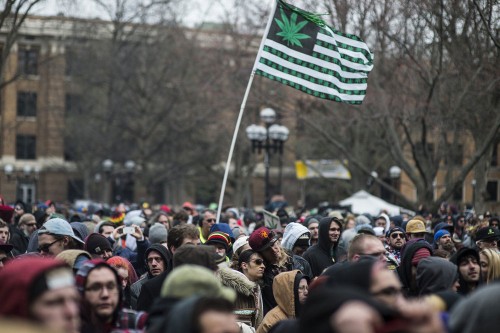A new study, published in the June issue of the Journal of the American Academy of Child & Adolescent Psychiatry, says the number of teens with marijuana-related problems and the percentage of use have declined in recent years.
A team of researchers at the Washington University School of Medicine in St. Louis analyzed federal data from national surveys of more than 216,000 adolescents ages 12 to 17 over a 12-year span.
They found that the number of adolescents who had problems related to marijuana (i.e. becoming dependent on the drug or having trouble in school and in relationships) declined by 24 percent from 2002 to 2013.
Teen marijuana use
More stories: Check out our coverage of this hot topic.
Weed news and interviews: Get podcasts of The Cannabist Show.
Subscribe to our newsletter here.
Watch The Cannabist Show.
Peruse our Cannabist-themed merchandise (T’s, hats, hoodies) at Cannabist Shop.
Over the same period, when asked whether they had used pot in the previous 12 months, adolescents reported fewer instances of marijuana use in 2013 than their peers had reported in 2002. Overall, the rate fell by 10 percent, according to the study, despite the fact more U.S. states are legalizing and decriminalizing marijuana use — a commonly assumed factor in the rising number of adults using the substance.
The team behind the study analyzed information collected by the National Survey on Drug Use and Health, which falls under the purview of the U.S. Department of Health and Human Services. The annual NSDUH surveys ask youth about use of tobacco, alcohol, illicit drugs and mental health.
Richard A. Grucza, an associate professor of psychiatry and lead author of the study, explained that behavioral problems often are signs of childhood psychiatric disorders, not directly linked to marijuana usage.
“We were surprised to see substantial declines in marijuana use and abuse,” Grucza said in a media release. “We don’t know how legalization is affecting young marijuana users, but it could be that many kids with behavioral problems are more likely to get treatment earlier in childhood, making them less likely to turn to pot during adolescence. But whatever is happening with these behavioral issues, it seems to be outweighing any effects of marijuana decriminalization.”

The researchers’ findings are a stark contrast compared to the usage rate among college students, which was reported at a 35-year high according to a study conducted by the University of Michigan’s Institute for Social Research in 2015.
Hard data aside, the issue of teen marijuana use remains a highly controversial issue in both legal states setting regulation precedents and states considering cannabis law reform. Colorado Governor John Hickenlooper recently told Katie Couric in an interview that teen usage was one of his initial concerns in weighing legalization and that he’s still worried about how THC affects developing brains.
But in 2014, the first year of recreational marijuana sales in Colorado and Washington, adolescent cannabis use did not significantly change in either state, according to a federal survey released in 2015.
